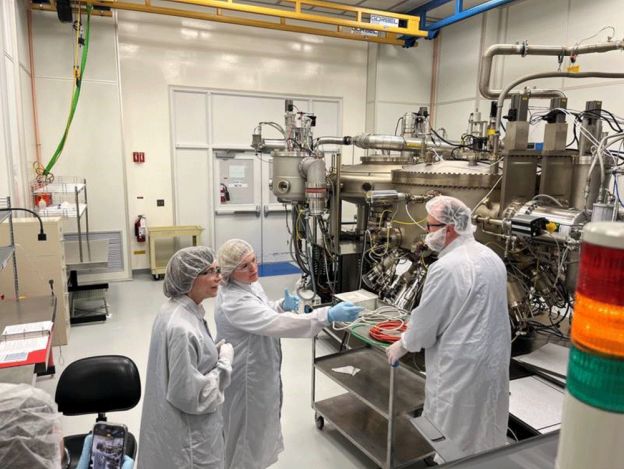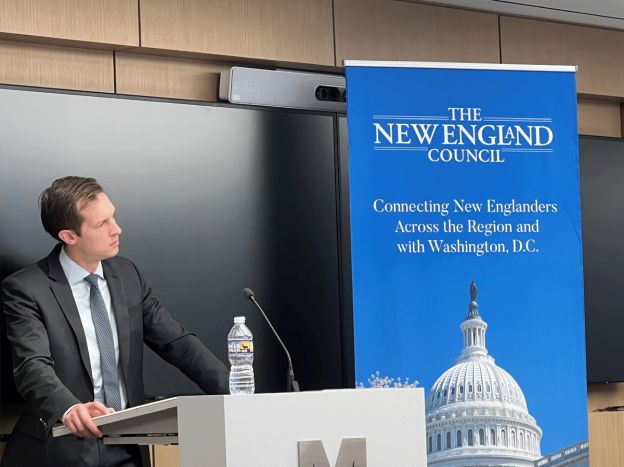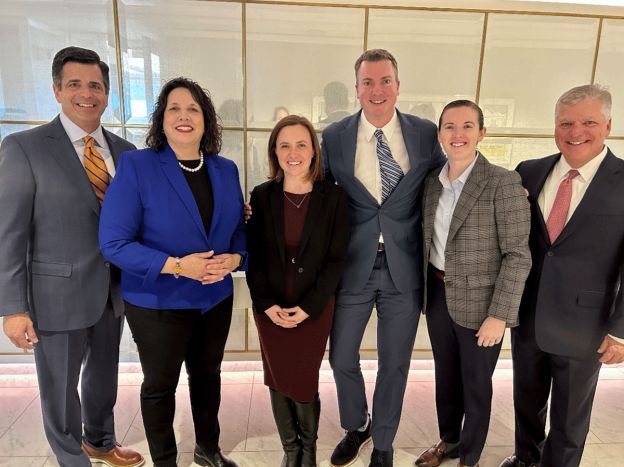ML Strategies is pleased to launch our new quarterly newsletter,
Hill to Hill, capturing recent policy and political
developments in Washington, DC and Boston, MA.
Federal Update & Latest Developments
Capitol Hill Off to Strong Start for 118th Congress
After three years of a pandemic, during which Capitol Hill was closed to visitors or access strictly controlled, House and Senate offices are finally reopened for business as usual for the 118th Congress. ML Strategies has been using this newfound freedom to reacquaint ourselves with old friends and connect with some staffers in person for the first time after years of video conferencing. The lines are long, but there is excitement in the air!
With their new majority in the House of Representatives, Republicans are actively working to follow through on a number of campaign promises. In Q1, they quickly passed legislation to rescind funding passed last year to bolster the Internal Revenue Service as well as the Lower Energy Costs Act (H.R. 1), a significant energy package primarily focused on fossil fuels and permitting.
Senate Democrats, having expanded their majority, have focused on confirming nominees to serve in the Biden administration, including a new IRS Commissioner as well as judicial nominees.
The budget and appropriations process for Fiscal Year 2024 is also underway, with President Biden submitting his budget proposal on March 9, 2023 and the House and Senate appropriations committees holding hearings. As part of this process, personal offices of Senators and Representatives have accepted requests for "Community Project Funding," otherwise known as earmarks, with rolling deadlines for submission throughout the month of March. House Republicans have made several significant changes to the earmark process this year. First, the Appropriations Committee will limit earmarks to one-half of one percent of discretionary spending, a reduction from the one-percent limit in the previous Congress under Democratic control. There is no change in the Senate, where the one-percent threshold remains in place. Republicans have also prohibited earmark requests for the Department of Defense appropriations bill, the Financial Services appropriations bill, and the Labor-Health and Human Services-Education appropriations bill. The bills are still open to programmatic and language requests from House members.
What's Happening at the Executive Branch?
The Biden administration continues to roll out the implementation of landmark legislation passed last Congress — the Bipartisan Infrastructure Law (BIL), the Inflation Reduction Act (IRA), and the CHIPS and Science Act. Each month, opportunities from the BIL and IRA are highlighted in ML Strategies' Energy & Sustainability Washington Update. ML Strategies is also excited to announce that we are collaborating with Mintz to develop a matrix of funding opportunities through the Bipartisan Infrastructure Law and Inflation Reduction Act. The matrix will be available at mlstrategies.com and updated quarterly — stay tuned!
The newly established Advanced Research Project Agency for Health (ARPA-H) made a series of announcements in March, just a year after President Biden first described his vision for the agency. These included a much-anticipated process for selecting sites for two hubs, an initial funding opportunity, and an ideas competition.
While the ARPA-H headquarters will be in the National Capital Region, two hubs and their associated spokes will help the agency carry out its mission nationally. A customer experience hub will focus on user testing, adoption, access, and trust of ARPA-H's projects, and an investor catalyst hub will provide resources to help bring projects to market.
There is a great deal of interest all over the country in being a part of ARPA-H's infrastructure. The Request for Consortium Agreements lays out a timeline for the selection process, culminating with an announcement of awards by early fall of 2023. The prime awardees will be consortia with experience with "other transaction agreements," a federal contracting instrument commonly used to streamline research and development. Successful applicants will be well established in their local, regional, and national health care ecosystems and bring to ARPA-H a network of spokes that reach diverse patient populations.
ARPA-H also opened its first Open Broad Agency Announcement (Open BAA), seeking funding proposals for research aligning with the agency's mission of accelerating better health outcomes. The BAA encourages unconventional approaches and proposals that challenge accepted assumptions. Projects advancing President Biden's Cancer Moonshot, as well as more disease-agnostic concepts, will be competitive.
ARPA-H also got in on March Madness by announcing a bracket of its own: the ARPA-H Dash to Accelerate Health Outcomes. The competition will pit 64 evidenced-based ideas to transform health against each other. Online discussion and voting will narrow the field to an eventual champion on May 16, which will receive a $15,000 prize. Nominations for the field will be accepted from March 29 through April 7.
The CHIPS and Science Act, passed last summer, appropriated $50 billion to help secure the domestic semiconductor supply chain. The bulk of that funding, $39 billion, is to incentivize investment in domestic facilities for fabrication, assembly, testing, advanced packaging, production, or R&D of semiconductors as well as materials and equipment used to make semiconductors. On February 28, the Commerce Department issued the first of three Notices of Funding Opportunity (NOFO) for CHIPS Incentives, or the grants, loans, and loan guarantees that comprise the $39 billion.
In addition to program priorities and evaluation criteria, the NOFO provided some key dates:
- May 1 — Optional pre-applications for current-generation, mature-node, and back-end production facilities may be submitted,
- June 26 — Applications for current-generation, mature-node, and back-end production facilities may be submitted,
- Spring 2023 — NOFO #2 for semiconductor materials and equipment projects to be issued, and
- Fall 2023 — NOFO #3 for R&D projects to be issued.
ML Strategies is advising several clients on the implementation of the CHIPS and Science Act. Client IQE, a worldwide leader in the manufacturing of compound semiconductor epitaxial wafers, welcomed Rep. Kathy Manning (D-NC-06) to its facility in Greensboro, North Carolina in March. IQE's products are in some of the most advanced devices available today, and will be relied upon to enable the next generation of technology, including quantum computing, autonomous vehicles, and 6G. The congresswoman is pictured below touring one of IQE's clean rooms and learning firsthand how these cutting-edge materials are made.

ML Strategies is actively engaged in these opportunities, and
welcomes any questions about how your organization may be
impacted.
Boston Update & Latest Developments
New and Old Faces Settling in on Beacon Hill
On Wednesday, January 4, members of the 193rd General Court were sworn into the Massachusetts State Legislature. As anticipated, Democrats continue to maintain a supermajority in both chambers, in turn ensuring continuity in their respective positions of leadership. Senate President Karen Spilka (D-Middlesex & Norfolk) and Speaker of the House Ron Mariano (D-Quincy) continue to lead their respective chambers, building on their working relationship oriented toward passing legislation on issues that matter most to residents of the Commonwealth, including health care, climate and energy, housing, and transportation, among others. With the continuity in leadership from the last legislative session, the 193rd General Court will retain many of the same chairmanship positions from the last session. Among those familiar faces are Chairs of the Joint Committee on Ways and Means. Chairman Michael Rodrigues (D-1st Bristol & Plymouth) and Chairman Aaron Michlewitz (D-North End) will drive policies with a fiscal note, a powerful role in the legislature in a time when the Commonwealth is flush with funds.
On January 5, the day following the commencement of the 193rd General Court, Governor Maura Healey and Lieutenant Governor Kim Driscoll were sworn into office, concluding the procedural transition from the Baker-Polito to the Healey-Driscoll administration. The House Chamber, where governors take their oath and give their inaugural address, looked much like a reunion, as both former Massachusetts Attorney General Healey and former Mayor of Salem, Kim Driscoll, are no strangers to the Massachusetts legislature and staff. In her inaugural address, Gov. Healey touched on various priorities her administration promised to focus on, including, but not limited to, allocating 1% of the annual budget toward clean energy and climate change priorities, creating a standalone housing secretariat in her cabinet, creating a first-in-the-nation Climate Chief, providing much-needed funding for early education, and of course, fixing the MBTA. The Healey-Driscoll administration continues to build a cabinet with a diverse group of leaders, drawing from their various skill sets and experiences to shape policies and programs that are representative of the residents of the Commonwealth.
The Ball Is in the Legislature's Court
The start of any new legislative session is full of procedural happenings. Members are sworn in and assigned to their new offices and committees, followed by the scheduling of public hearings on the thousands of timely-filed bills each session. As the legislature settles into the new session, the Executive Office has filed various proposals to kick off the new governor's historic administration.
On January 30, the Healey-Driscoll administration filed a $282 million supplemental budget package to address critical needs in the Commonwealth. Such items include additional and urgent funding for universal school meals, emergency assistance for families in need of shelter, and food security benefits provided by the Supplemental Nutrition Assistance Program (SNAP).
On February 27, the Healey-Driscoll administration unveiled a $742 million tax relief package, focusing on savings for families, renters, and senior citizens across Massachusetts. The package proposed increases to the annual child and family tax credit, rental deductions, a reduction to the short-term capital gains tax (coupled with the raising of the state's estate tax threshold), and a tax credit to keep low-income seniors in their homes.
On March 1, The Healey-Driscoll administration and Secretary of the Executive Office for Administration and Finance, Matt Gorzkowicz, filed their FY2024 budget proposal, also known as House 1, or "H1." Gov. Healey refers to her office's $55.5 billion budget as a "downpayment" on the goals and priorities her administration and the Commonwealth plan to achieve over the coming years. Among the big ticket items in H1 are: fully funding the third phase of the Student Opportunity Act, dedicating 1% of the state's budget resources to the Executive Office of Energy and Environmental Affairs, and investments to improve the various modes of transportation for residents — highways, roads and bridges, trains, buses, airports, and bicycles.
On March 17, the Healey-Driscoll administration filed another supplemental budget, in the amount of $734 million, to address funding needs across a variety of sectors, including health care, clean energy, transportation, and early education and care.
The ball is now in the legislature's court to act on the various proposals Gov. Healey and her team have laid before them. On Wednesday, April 12th, Chairman Michlewitz and the House Committee on Ways and Means released their FY2024 budget proposal, which will be up for debate during the week of April 24 – 28. The House Ways and Means budget ($56.2 billion) was a $700 million increase over the Governor's budget. Within the budget proposal, Chair Michlewitz included the $587 million tax relief package, which was passed by the House on Thursday, April 13th. The House Ways and Means budget also includes, for the first time, an Education and Transportation Fund, established to house the revenue from the recently-passed income surtax. The House proposed a 50/50 split of revenues to education and transportation, a slight tweak to the Governor's proposal of 51/49.
The team at ML Strategies is actively tracking all actions taken
on the above-outlined funding and relief packages. Please don't
hesitate to reach out with any questions or concerns for you or
your company as the legislative session progresses.
Around MLS
The Washington office of ML Strategies was pleased to host Rep. Jake Auchincloss (D-MA) on February 1 as part of the New England Council's Capital Conversations Series. We had a strong turnout as in-person events continue to make a comeback, and we appreciate the congressman sharing his goals for the 118th Congress with us.

The Boston office of ML Strategies hosted Lieutenant Governor Kim Driscoll on March 30, showcasing ML Strategies' reach and connectivity with the Healey-Driscoll administration. LG Driscoll continues to lead on issues that matter most to residents of the Commonwealth, a skill set that was developed throughout her tenure as Mayor of Salem, Massachusetts. The administration is off to a strong start and ML Strategies looks forward to continued work with the governor and lieutenant governor throughout their time in the corner office on Beacon Hill.

The content of this article is intended to provide a general guide to the subject matter. Specialist advice should be sought about your specific circumstances.




